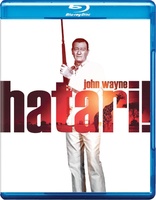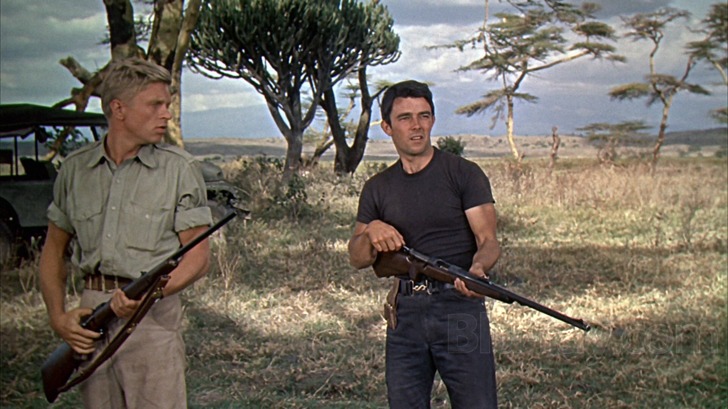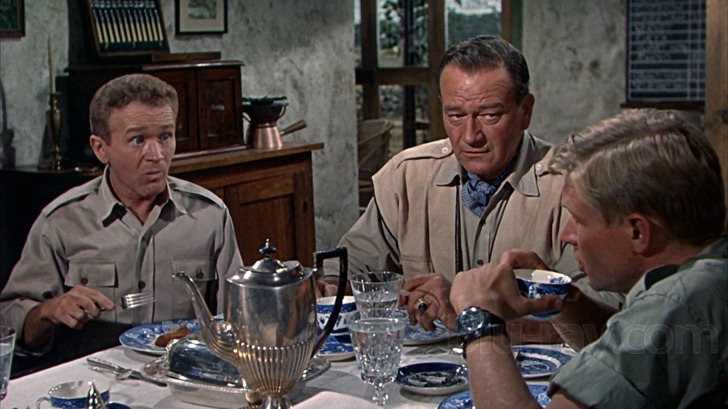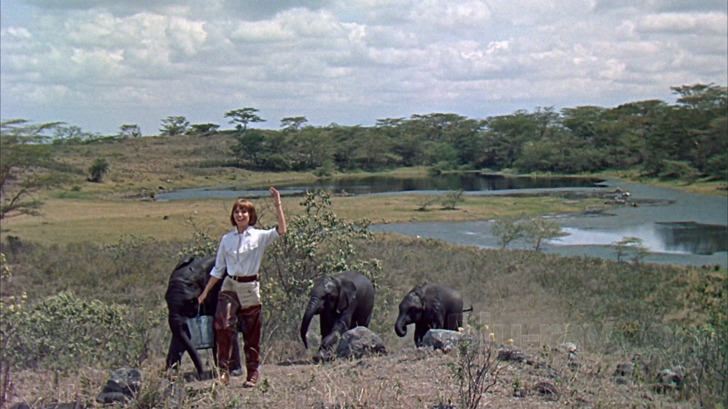Hatari! Blu-ray Movie
HomeHatari! Blu-ray Movie 
Warner Bros. | 1962 | 158 min | Not rated | Mar 11, 2014
Movie rating
7.5 | / 10 |
Blu-ray rating
| Users | 3.5 | |
| Reviewer | 2.0 | |
| Overall | 2.8 |
Overview
Hatari! (1962)
A group of men trap wild animals in Africa and sell them to zoos before the arrival of a female wildlife photographer threatens to change their ways.
Starring: John Wayne, Hardy Krüger, Elsa Martinelli, Red Buttons, Gérard BlainDirector: Howard Hawks
| Comedy | Uncertain |
| Adventure | Uncertain |
| Family | Uncertain |
Specifications
Video
Video codec: MPEG-4 AVC
Video resolution: 1080p
Aspect ratio: 1.78:1
Original aspect ratio: 1.85:1
Audio
English: Dolby TrueHD 2.0 Mono
French: Dolby Digital 2.0 Mono
Spanish: Dolby Digital 2.0 Mono (224 kbps)
Subtitles
English SDH, French, Spanish
Discs
50GB Blu-ray Disc
Single disc (1 BD)
Playback
Region free
Review
Rating summary
| Movie | 4.0 | |
| Video | 1.5 | |
| Audio | 3.5 | |
| Extras | 0.5 | |
| Overall | 2.0 |
Hatari! Blu-ray Movie Review
Gesundheit! You Must Be Allergic to Bad Blu-ray
Reviewed by Michael Reuben March 7, 2014Legendary director Howard Hawks has been accused of making his 1962 hit Hatari! primarily because he wanted to take a studio-paid vacation chasing big game in Tanganyika (now Tanzania), Africa. Maybe so, but Hawks's idea of a vacation was to shoot a movie, even if all he had was a story idea, an incomplete script and only one star, John Wayne, instead of the two he'd originally envisioned (Wayne plus Clark Gable). Ever the iconoclast, Hawks was the exception who proved the rule that a good film requires a solid script. He'd already proved his ability to make a classic murder mystery, The Big Sleep (1946), from a script in which, to this day, no one, including Hawks and the screenwriters, has been able to figure out who killed whom. One of that film's screenwriters, Leigh Brackett, wrote and rewrote pages from a story outline by Harry Kunitz (Wait Until Dark) that attempted to give Hawks what he wanted: scenes of hunters chasing big game in Africa, connected by some sort of narrative. Not just ordinary hunters, though. Hatari! (the word means "danger" in Swahili) chronicles the exploits of professionals who capture live animals for zoos and circuses. Hawks hired a government-licensed animal catcher as a technical adviser, but he insisted that all the actors (at least the men) do their own stunts, capturing zebras, monkeys, water buffalo and a rhinoceros for real. Aside from the obvious rear-projection shots in vehicles (necessary in the days before gyro mounts and Steadicams made it possible to capture viewable shots in moving vehicles), much of the footage in Hatari! is remarkable for its realism. But Hawks knew better than to make a documentary. The man who did so much to define the screwball comedy with Bringing Up Baby (1938) and His Girl Friday (1940) understood that the best way to engage an audience between the animal adventures was to keep 'em laughing. When my brother and I saw Hatari! in the theater as kids, it was like a trip to the zoo with some adults acting silly in between. From a much older perspective, I realized that Hawks and Brackett shoehorned a classic romantic comedy around the exploits of Wayne and his colleagues capturing wild animals on the African plains. As Paramount's trailer for Hatari! faithfully promised, the film really did have something for everyone in the family, which no doubt helped it become the eighth highest grossing film of 1962.

Wayne plays Sean Mercer, the hard-boiled leader of a pack of eccentrics who are equally at home dining off fine china in their English-built headquarters or camping out in the wild on an extended expedition seeking their quarry. Sean's right-hand man is known by everyone as "Pockets" (Red Buttons), because he always wears cargo pants. A classic comic sidekick, Pockets parries Sean's bad temper by facetiously addressing him as "Bwana". The most skilled driver on the team is Kurt Muller (Hardy Krüger), a professional racer, who also happens to be a crack shot. A long-time colleague of Sean's is Little Wolf (Bruce Cabot), generally known by what might now be considered the politically incorrect nickname of "the Indian", because he is Native American. From Mexico comes Luis Francisco Garcia Lopez (Valentin de Vargas), a former bullfighter. Partway through the film, the group acquires a new member, a Frenchman named "Chips" Maurey, who is charming, quick with his fists and a better shot than Kurt. Who is he, and what is his background? If he can do the job, Sean doesn't care. The group includes two women. One, Brandy de la Court (Michčle Girardon), grew up with her father doing this work in Tanzania, until he was killed by a rhino that slipped its ropes. The men in the group have long thought of her as "little Brandy", but she isn't little any longer, and a few of them have started to notice that she's a grown woman. Chips, who never knew the child, notices immediately, and his interest in Brandy ignites a rivalry with Kurt for her affections. Their contest is one of the many subplots that fills the time between animals hunts. The other woman is an unexpected arrival. Anna Maria D'Alessandro, or "Dallas" for short (Elsa Martinelli), is a top photographer dispatched by the Swiss zoo that has engaged Sean Mercer's team for the season. The zoo wants Dallas to get photos for a publicity campaign. Sean doesn't like having an amateur tagging along, and he really doesn't like Dallas, because . . . because . . . well, he just doesn't. Anyone familiar with the basic grammar of rom-com plotting should know what this means, and in case anyone in the audience of the early Sixties didn't get it, Hawks and his screenwriter have Pockets explain to Dallas that Sean is mean to her because he likes her. Hawks lures viewers into the film by opening with a rhino pursuit in which a member of the team is badly injured, and the shadow of that incident hangs over the movie. The Indian believes that rhinos are bad luck for them, given how Brandy's father died. By the end of the film, of course, the rhino curse will have been broken, though not without difficulty (some of which was unscripted and unanticipated, and the camera crew had the presence of mind to keep rolling). But the unifying thread of Hatari! is the comically impossible, ever-deferred romance between Sean and Dallas, who, whenever they're on the verge of making contact, are always interrupted by some outlandish event. In the interim, Dallas gets thrown around the back of a jeep, terrorized by a big jungle cat (who turns out to be tame), initiated into the local Arusha tribe and drives Sean to distraction with her passion for adopting abandoned baby elephants, a plot point that inspired composer Henry Mancini's music cue that became a worldwide hit entitled "The Baby Elephant Walk". Hatari! has two separate conclusions. The first is the successful rhino capture. The other is a wild pursuit of Dallas through the local town after she's run off distraught from an argument with Sean. Everyone is involved, including the baby elephants, and the sequence is pure screwball slapstick. It ends the way all romantic comedies do (except for the elephants).
Hatari! Blu-ray Movie, Video Quality 

Russell Harlan's (To Kill a Mockingbird) color cinematography for Hatari! was nominated for an Oscar. So it pains me to report that this 1080p, AVC-encoded Warner Blu-ray of a Paramount catalog title does indeed appear to be the same poor release that is already circulating in Europe and has been anticipated with dread ever since the title was announced in North America. I was prepared for disappointment when I spun up the disc, and even then I could not believe what I was seeing. Eight years into the Blu-ray format, transfers of such poor quality should be a thing of the past. As I have said previously, one can only guess at the age of a transfer, but one can certainly identify the aesthetic principles that guided the colorist(s) who worked on it. Hatari! looks like something made for an age of NTSC resolution and small screens. The colors are weak and undersaturated, as if the transfer were intended for media with limited color space and a danger of color noise or bleeding. Detail is weak and inconsistent. Worst of all, sharpening has been applied throughout the image so that the entire frame suffers from digital harshness, with film grain converted into digital noise and figures unnaturally "popped out" of the frame by their enhanced edges. The electronic sharpening isn't so bad as to create significant ghosting, but it destroys any semblance of a film-like image. In short, this looks like an image created for DVD. It is not an upconversion (though some will no doubt claim otherwise), but the colorist who did the transfer appears to have had an eventual DVD image in mind. This entire transfer should be junked and a new one made from scratch. Discussion of compression and bitrates is irrelevant. Even uncompressed, this transfer would still look bad. If I didn't have this review to write, I'm not sure I would have finished the film.
Hatari! Blu-ray Movie, Audio Quality 

On the audio front, the news is somewhat better. Hatari!'s original mono track has been presented as lossless Dolby TrueHD 2.0, with identical front and left right channels, and it's an effective track with good dynamic range and surprisingly powerful impact, especially during the dramatic chase sequences. When fierce animals like the rhino crash into the moving vehicles, the sound may not spread throughout the room, but it's enough to convey the danger. Many of the animal cries had to be imitated and dubbed by game experts and zoo collectors, because wild creatures don't emote on cue, but the various cries, growls and bellows sound convincing, and the human dialogue is clear. Henry Mancini's score would no doubt sound better in stereo, but it sounds pretty good in lossless mono.
Hatari! Blu-ray Movie, Special Features and Extras 

Other than the film's trailer (480i; 1.78:1, enhanced; 3:00), the disc contains no extras. Paramount's 2001 DVD was similarly bare bones.
Hatari! Blu-ray Movie, Overall Score and Recommendation 

Despite its often clunky plotting, Hatari! is a grand entertainment with spectacular scenery and uniquely realistic action. Unfortunately, watching it on this Blu-ray is not an enjoyable experience, and certainly not one I can recommend, except perhaps on a tiny screen or on your computer desktop—and Blu-ray buyers deserve better. So does Hatari!
Similar titles
Similar titles you might also like

What's New Pussycat?
1965

Sands of the Kalahari
4K Restoration
1965

Tarzan's Three Challenges
Warner Archive Collection
1963

Allan Quatermain and the Lost City of Gold
1986

40 Pounds of Trouble
1962

Born Free
Limited Edition to 3000
1966

King Solomon's Mines
2004

It's Only Money
1962

Ulzana's Raid
1972

Race for the Yankee Zephyr
Treasure of the Yankee Zephyr
1981

The Last Remake of Beau Geste
1977

Africa Screams
Special Limited Edition of 2,500 Units
1949

Francis in the Navy
1955

Come Blow Your Horn
1963

Grace Quigley
1985

The Roots of Heaven
Limited Edition to 3000 - SOLD OUT
1958

The Maggie
High and Dry
1954

North to Alaska
Fox Studio Classics
1960

Francis Goes to the Races
1951

'Neath the Arizona Skies
'Neath Arizona Skies
1934


